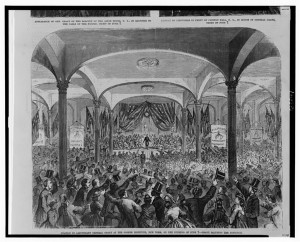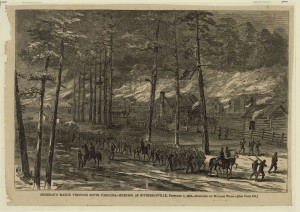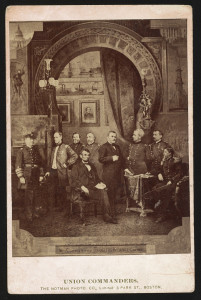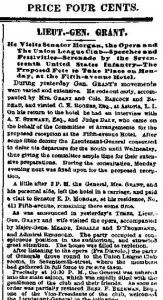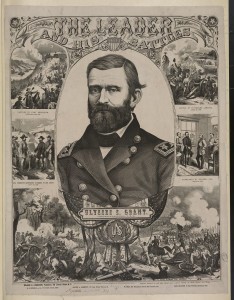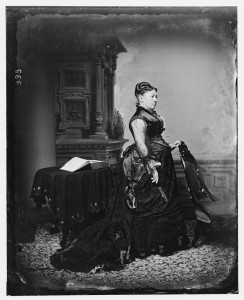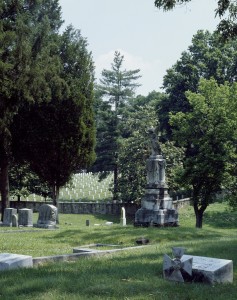This commission is worthy of support, for it will relieve their necessities, and assuage the distress which we, in the course of this war, have been compelled to inflict on them.
The American Union Commission held a big fundraiser at the Cooper Institute on November 13, 1865 to support its work helping the destitute South. The Commission invited some famous Union generals. Two sent in their regrets.
From The New-York Times November 14, 1865: …
The following letters were then read by Rev. LYMAN ABBOTT, General Secretary of the Union Commission: …
LETTER FROM LIEUT.-GEN. GRANT.
HEADQUARTERS ARMIES OF THE UNITED STATES, WASHINGTON, D.C., NOV. 10, 1865.
Rev. Lyman Abbott, General Secretary American Union Commission:
SIR: I have received your invitation to be present at the meeting of the “Union Commission” in the City of New-York on the 13th inst. At the time of receiving this invitation I did not know but it would be possible [f]or me to attend. I now find that it will not be possible. It affords me great pleasure to see so respectable an organization as yours interested in so deserving a cause. However we may have differed from our Southern brethren in the events of the last four years, we have now become one people, and with but one interest. The war has worked such ruin upon much of the South that without some aid from those who can give it, there must be much suffering the coming Winter. The work of your commission, while it will give present aid where it is so much needed, will also serve to heal old wounds.
Whatever is calculated to increase the friendship and brotherly feeling between the two sections of our country, I heartily approve of. Very respectfully, your obedient servant, U.S. GRANT, Lieut.-Gen.
LETTER FROM MAJOR-GEN. SHERMAN.
HEADQUARTERS MILITARY DIVISION OF THE MISSISSIPPI, ST. LOUIS, Mo., Oct. 27,1865.
Messrs. Jos. P. Thompson and others:
GENTLEMEN: I have your letter of Oct. 24, inviting me to your city to address the citizens of New-York on the condition and wants of the people of the South, left destitute and in need by the devastations of war. It will be impossible for me to come to New-York, or to address the people on that or any other subject. It would be foreign to my office, which gives me a field of duty large enough to absorb all of my thoughts, time and charitable wishes.
I am pleased, however, to know that so many good people in your great city have the means and willingness to bestow a part on those whom war has left helpless and in want, and I know there are men in your midst far better qualified than I am to point out the way in which such charity will do the most good.
Complimenting you on the good policy which has prompted your action, and thanking you for uniting my name therewith.
I am, with great respect, your obedient servant, W.T. SHERMAN, Major-General. …
General Meade was able to attend the meeting.
… REMARKS OF MAJ.-GEN. MEADE.
Gen. MEADE, who was received with a perfect storm of applause, said: LADIES AND GENTLEMEN: It is hardly possible for me to express in suitable language the gratitude I feel from your reception of me this evening. It would be vanity in me to say that I thought my name was not well known here; but I really did not expect this flattering reception, and am deeply grateful for it. It is only right that I should explain why I am here before you to-night. I am no speaker, and it seems to me to be audacity only equal to that required to fight the great battle of Gettysburgh to come before you after listening to the flow of eloquence which you have just heard; but I was told in Philadelphia that, if I came here to-night, I might do some good. I, therefore, said I would come and tell you briefly how heartily I indorse the plan of the commission, and wish it success. As commander of a very large army, it has fallen to my lot to witness the ruin which has fallen on a large portion of the country. I can tell you that you cannot conceive the distress which exists in the Southern States. It is hardly necessary to dilate on this point. Since the rebellion broke out the men have been engaged in war, the women in providing for their wants. They have had no means of making money. Their currency is now destroyed, and when you consider these things you must see how great is their distress. The question is, ought we to relieve it? I will not reason on the morality of the question, but I will tell you what we soldiers do. After fighting a battle, when the dead and wounded lay thick around us, we did not ask any questions, but we took tender care of such as needed it. That should be your morality. The Southern people have now ceased to be enemies, and are disposed to be friends. It is your duty, as Christians and citizens, and for your material interests, to relieve them. This commission is worthy of support, for it will relieve their necessities, and assuage the distress which we, in the course of this war, have been compelled to inflict on them. The officers of this association are among the first men in the country, and will make the very best use of all funds that may be intrusted to their care. Thanking you for your very kind reception of me this evening, I bid you adieu. …
General Grant sure was a media magnet. A couple days later he made it to New York City. He attended Fra Diavolo with his wife and General Meade.
__________________________________________________
I haven’t found a reference for the following letter of April 25, 1865, but it would seem to show that General Grant observed and sympathized with the South’s destitution when he was in North Carolina overseeing Johnston’s surrender to Sherman. As he wrote to his wife:
Dear Julia: We arrived here yesterday. … Raleigh is a very beautiful place. The grounds are large and filled with the most beautiful spreading oaks I ever saw. … The suffering that must exist in the south the next year, even with the war ending now, will be beyond conception. People who talk of further retaliation and punishment, except of the political leaders, either do not conceive of the suffering endured already or they are heartless and unfeeling and wish to stay at home out of danger while the punishment is being inflicted. Love and kisses for you and the children. Ulys.[1]
_____________________________________________________
Images from the Library of Congress: General Grant at the Cooper Institute in June; burning McPhersonville; Union commanders; The Leader, Mrs. Grant, Carol M. Highsmith’s photo of Raleigh’s Oakwood Confederate Cemetery
- [1]Woodward, William E. Meet General Grant. New York: Premier, Fawcett World Library, Authorized Abridgment 1957. Print. page 208-209.↩

